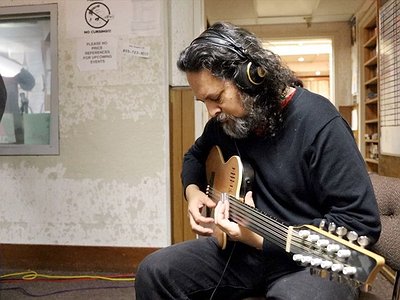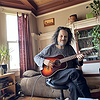Part 1
Name: Ernesto Diaz-Infante
Nationality: Chicano-American
Occupation: Composer, guitarist,
Current release: Ernesto Diaz-Infante's Bats in the Lavender Sky is out via Ramble.
If you enjoyed this Ernesto Diaz-Infante interview, and would like to find out more about his music, visit him on Instagram, bandcamp, and Soundcloud. He also has a personal page on the website of the Bay Improviser Community.
Over the course of his career, Ernesto Diaz-Infante has worked with a wide range of artists, including Lisa Cameron, Kyle Bruckmann, and Gino Robair.
[Read our Lisa Cameron interview]
[Read our Kyle Bruckmann interview]
[Read our Gino Robair interview]
When did you first start getting interested in musical improvisation?
Strangely enough, my first moments of improvisation were as a child when I was played organ for the local church.
Later, I studied improvisation at the College of Creative Studies at the University of California at Santa Barbara, and then more thoroughly at California Institute of the Arts.
Which artists, approaches, albums or performances involving prominent use of improvisation captured your imagination in the beginning?
My first moments of awe, I could say, were when I heard the long guitar solos of Carlos Santana on Moonflower.
As well, Jefferson Airplanes’s A Small Package of Value Will Come to You, Shortly blew my mind.
So suffice to say, psychedelic rock was an early influence. I was one of those people that used sit down whoever was near me and say, “You’ve got to hear this ...“
Later in college, Cecil Taylor’s Live in Bologna and John Coltrane’s Interstellar Space made a huge impression.
The real turning point came when I studied composition at CalArts with Wadada Leo Smith. I had his Kulture Jazz and Golden Hearts Remembrance CDs, and they were so inspiring.
[Read our Wadada Leo Smith interview]
Derek Bailey’s music and approach to the guitar really opened my mind on how to play the guitar differently. His albums Fairly Early with Postscripts and First Duo Concert with Anthony Braxton, were game-changers, and the final nails in the coffin on my path of making this crazy-ass music.
Focusing on improvisation can be an incisive transition. Aside from musical considerations, there can also be personal motivations for looking for alternatives. Was this the case for you, and if so, in which way?
Writing music on paper had become tedious, and I needed a break from notation. It felt restrictive.
On the other end of the spectrum was this completely immersive experience of being surrounded by sound in a free, playful, and cathartic manner.This drive to be absorbed in the present moment in a really different way, with more emotion and less headiness.
What, would you say, are the key ideas behind your approach to improvisation? Do you see yourself as part of a tradition or historic lineage?
I have consistently been drawn to structured improvisation. I have an outline of what I set out to do, a plan of attack, and I give myself permission to veer off if that feels right or another opportunity present itself.
It’s not unlike when I set out to travel. I make plans of where I want to go, what I want to see. I don’t hold myself to those plans if something better arises, but they are good to fall back on.
My most recent example of this is diciembre that I recorded last December and came out on scatterArchive in October.
As far as lineage, I think my main influence has been Wadada Leo Smith. He opened me up to all of my emotion, as well as the release of ever trying to be something that I am just not. As a mentor, he was wonderful and gave me the thumbs up to embrace myself and the eclectic nature of my musical talents and interests. On my solo CD s/t, I pay tribute to his influence conceptually.
Morton Feldman taught me to use silence and space in a new way and create a relationship with transcendence, not unlike my early organ church music. One of my favorite albums that I have recorded was For M.F. (for Morton Feldman).
What was your own learning curve / creative development like when it comes to improvisation - what were challenges and breakthroughs?
When I think about it, my biggest breakthroughs came when I committed to the fact that I was a musician, and I was going to devote my life to music. Coming from an uneducated Mexican family in a small agricultural town, my parents had other plans for me. They wanted me to be a priest, join the military, or work my way up at the local K-Mart. So that’s where they were at! It was all survival mode.
I am indebted to all of my past educators and professors at the community college level, University, and later in graduate school who encouraged and guided me. My musical career has alway been free-flowing and full of growth.
Granted, I have never expected it to make much money and that has allowed me to continue and not be frustrated.
Tell me about your instrument and/or tools, please. How would you describe the relationship with it? What are its most important qualities and how do they influence the musical results and your own performance?
Lately, I play electric and acoustic guitars. Right now I’m playing a Fender Jazzmaster electric guitar, a Fender California Series acoustic guitar, a Dean Acoustic-Electric Resonator guitar and also Traveler guitars, and I have been keeping it simple, not getting too bogged down with too many pedals and gear.
I like working with string instruments and exploring sounds or free fingerpicking. I record with a TASCAM Digital Portastudio and Zoom H5 Recorder.
In the past I have worked with an array of tools, instruments and found objects. Everything from a Eklind ball hex screwdriver, electronic tanpura, rocks, slides, mallets, Psaltery bow, chopsticks, prepared guitar, steel-string guitars, violins, field recordings, a broken CD player, four track manipulations, and other randoms items.
The eclectic nature of using all of these different tools / instruments helps ground me in the present moment as there’s alway something fresh or surprising about the sounds that are created.
Can you talk about a work, event or performance in your career that's particularly dear to you? Why does it feel special to you? When, why and how did you start working on it, what were some of the motivations and ideas behind it?
Most recently, I travelled to Paris and Lisbon and recorded with guitarist Michel Kristof, drummer Marcio Gibson, and cellist Helena Espvall along with my partner filmmaker / flutist Marjorie Sturm. Honestly, it was just so fun to be away and informed by a new space— that sensation of freedom and liberation and camaraderie. It feels like it has been such a long time, and it has been a long time!
The recording that I did with Michel and Marcio, Puzzle, came out in October on Muteant Sounds net label.
However, if I reflect on my earlier life, I performed a guitar meditation composition for peace as part of a Bang on a Can Marathon in San Francisco in 2008. It was accompanied by a video 'Sun Heals Life' by my partner, Marjorie Sturm. The Iraq War was in full motion and it seemed like it would never end. I guess it seems particularly poignant to me as the Palestinian-Israeli war / terrorism is reaching new depths of despair. All of this killing seems completely barbaric and primitive and sort of defies all logic.
I have made other political works throughout my years. I feel like if we give up believing in peace, we give up living, and creating music is living to me so it’s natural for me to try and connect the two.






